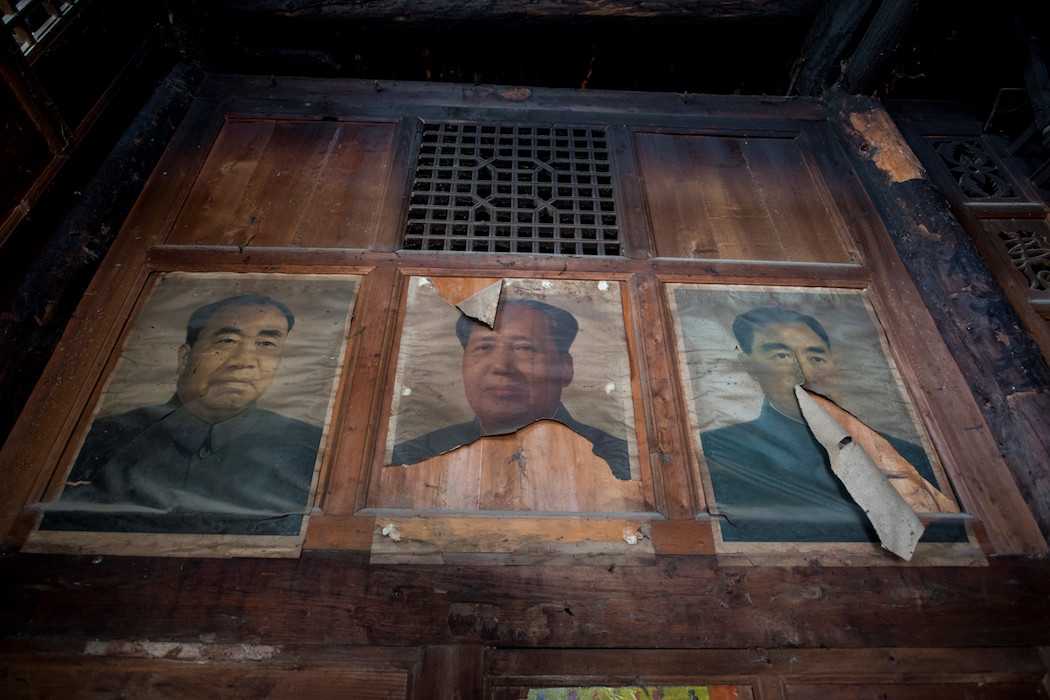
A poster of late Chinese chairman Mao Zedong (center) in a house in the village of Luobozhai (Radish Village) in Wenchuan county, Sichuan province. (Photo by Johannes Eisele/AFP)
Research has shed light on how pre-1949 Chinese revolution Communist Party cadres active in Christian churches continued their clandestine activities long after the take-over of the sprawling nation.
An investigation unraveled the mystery of a missing section of nearly 70-year-old communist directives dealing with Christian churches.
This provided hard evidence on the extent of infiltration, particularly of Christian youth organizations.
Professor Ying Fuk-tsang, director of the Divinity School at the Chinese University of Hong Kong, has long studied historical records related to undercover work of the Chinese Communist Party (CCP) in churches and church organizations.
The professor on May 7 spoke about his research at a Hong Kong seminar held jointly by the Christian Study Center on Chinese Religion and Culture (CSCCRC) and the Center for Christian Studies.
He cited the written directives relating to the Catholic and Protestant churches dated July 23, 1950, which he originally obtained some two decades ago.
The directives were split into eight sections, seven of them dealing with CCP policies on the practice of Christianity.
However, the deliberate deletion of one whole section stirred Ying's interest and he set out on a quest to ascertain the nature of the material that had been hidden.
On the document itself, there was a reference to the section having been 'deleted by the editor'; an apparent reference to censorship.
Ying had earlier researched pre-1949 CCP concerns over Christianity and intuition told him that the deleted section was about underground party members who were also Christians.
Years later, he got his hands on a book published by the CCP's Central United Front Work Department which constituted a breakthrough in his bid to find what was not intended to enter the public domain.
To his academic satisfaction, Ying learned that the deleted section of the directives was entitled 'Party members who are religious believers.'
The long lost material went on to state that "faithful and reliable party members" with dual identities should continue to work in churches without their true loyalties being revealed.
At the seminar, Ying explained that churches were infiltrated while the communists were pitted from 1927 in a civil war against the anti-communist Kuomintang (KMT).
A 1941 CCP document referred to "special groups" of party members clandestinely formed within various religious organizations.
The professor said it is now clear that the CCP years later still did not want such people to reveal their party membership.
"In the CCP's eyes, even after they got control over the whole country, fighting against Christianity still needed to be continued," Ying said.
Ying explained that the CCP had wanted to keep underground party members in churches so that, in the eyes of the government, they could be controlled and reformed.
This had especially been the case in the 1950s with the so-called three-self movement when covert party members took leading roles under the guise of being pastors or holding other church positions.
The origins of the so-called Three-self Principle in China date back to the late 19th century based on indigenization and the principles of self-governance, self-support and self-propagation.
The concept was later manipulated by the Communist Party as a "patriotic" church dovetailed with its policy of freeing the practice of religion from western imperialistic cultural aggression and other outside influences.
An article written by an elderly person, who did not reveal his name but was familiar with the three-self movement, was quoted at the seminar.
The article said that the Anglican Church of China as well as the young men's and young women's Christian associations (YMCA and YWCA) were targeted.
The associations were introduced into China as early as the late 19th century, mainly focusing on the use of Chinese youth and students to disseminate Western culture.
After the establishment of the CCP in 1921, efforts to win over students as party members included countering the appeal of Protestant youth groups such as the YMCA and YWCA.
Thus, in 1926, the Communist Youth League of China released a document, clearly stating that it would seek to destroy both associations by using its network to undermine the trust of young people in them.
Ying cited student communes as a later example of successful infiltration.
The 1953 directives stated that top leadership positions in student communes were held by underground party members.
The airing of Ying's research comes as the Catholic Church negotiates an agreement on future Vatican-Beijing relations and amid the imposition of new sweeping controls in China on the practice of religion.
It also comes as the Protestant Church has set out a long-term timetable to conform to government requirements on the so-called Sinicization of religious practice.
This is the first of three articles focusing on research carried out by Professor Ying Fuk-tsang about the Chinese Communist Party's efforts to infiltrate churches and church organizations. Click here to read part 2 of the series.


